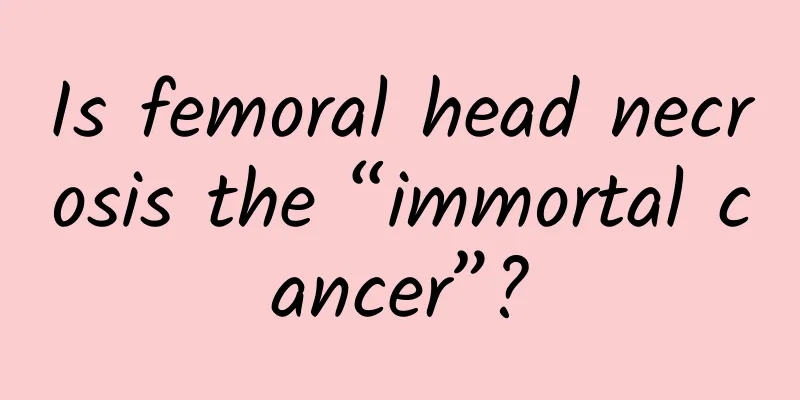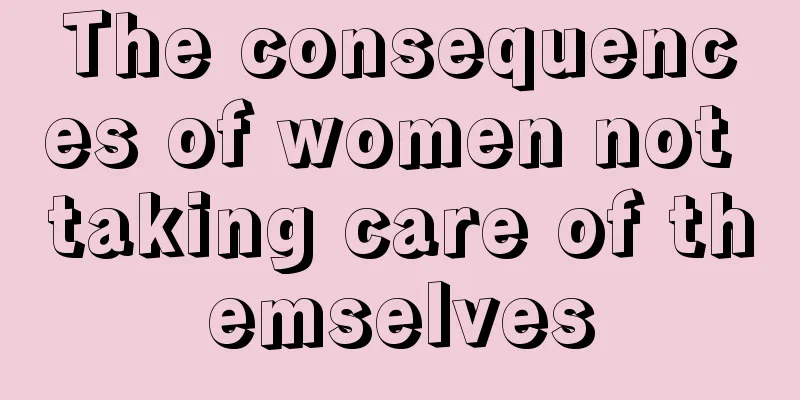Is femoral head necrosis the “immortal cancer”?

|
Author: Liu Weilu, attending physician at Nanfang Hospital, Southern Medical University Reviewer: Wang Jian, Chief Physician, Nanfang Hospital, Southern Medical University It is too exaggerated and inappropriate to describe femoral head necrosis as "immortal cancer", which will only bring a heavy psychological burden to patients. In clinical practice, we often see two types of patients: one type is anxious and even "white hair overnight" when they hear that they are diagnosed with femoral head necrosis; the other type is relieved and reborn when they hear that they are not suffering from femoral head necrosis. Why do people "change color" when talking about femoral head necrosis? Because some people believe that once femoral head necrosis occurs, it is difficult to reverse the progression of the disease by using drug treatment and other methods. Most patients will experience femoral head collapse and become disabled, thus requiring surgical treatment. Figure 1 Copyright image, no permission to reprint Nowadays, although femoral head necrosis is still incurable, most patients can work and live like normal people after proper treatment. Therefore, patients with femoral head necrosis must go to regular medical institutions for treatment, so that they can receive professional diagnosis and staging, and receive standardized treatment. They should not listen to unproven folk prescriptions or secret recipes, and should not rush to seek medical treatment. 1. What are the early “signals” of femoral head necrosis? 1. Pain: It is the most common clinical manifestation of femoral head necrosis, and it often occurs in the hip joint (crotch), thigh root (hip, groin) and buttocks. The pain of patients with early femoral head necrosis is mostly dull pain, which often occurs after activities or fatigue, and can generally be relieved by rest. However, if it is not promptly rested and treated, the pain will become more and more severe, gradually developing into persistent pain, and the range may radiate to the knee joint. Figure 2 Copyright image, no permission to reprint 2. Decreased hip joint function: As the disease progresses, the patient's hip joint becomes less and less flexible, making it difficult to bend over to tie shoelaces or cross one's legs. 3. Lameness: Femoral head necrosis causes atrophy of the muscles around the femoral head. In the late stage of femoral head necrosis, the femoral head will collapse, causing the affected limb to shorten. The patient cannot bear weight on the affected limb when walking, and limps, swaying like a duck when walking. If you find the above symptoms, you should suspect whether you have femoral head necrosis. It is recommended to go to the hospital for examination in the early stage of pain to clarify the cause of the pain. 2. Is hip pain definitely caused by femoral head necrosis? Hip pain does not necessarily mean that you have femoral head necrosis. In addition to femoral head necrosis, there are many other diseases that can cause hip pain. The following are the five most common diseases. 1. Hip muscle strain: Most patients have a history of acute trauma, and often have symptoms such as local swelling and tenderness of the hip joint, and bruising of the skin. 2. Femoral neck fracture: If it is an impacted fracture, its clinical manifestations are very hidden. The patient often does not show typical limited movement and only has slight pain in the hip, so it is easy to miss the diagnosis. 3. Hip osteoarthritis caused by hip dysplasia: Generally caused by congenital hip dysplasia, the femoral head becomes enlarged, the acetabulum becomes shallow and cannot cover the femoral head, and the femoral head is unevenly stressed, resulting in accelerated wear. With age, it develops into hip osteoarthritis, the main symptoms of which are hip pain and limited movement. Most patients are women. 4. Immune diseases involving the hip joint: Ankylosing spondylitis and rheumatoid arthritis often involve the hip joint and other parts, causing pain symptoms. 5. Lumbar disc herniation: One of the causes is irritation of the lumbar nerves. When the patient has back pain, it can also cause hip or buttock pain. In short, femoral head necrosis is only one of the causes of hip pain. What exactly causes hip pain still needs to be handed over to a professional doctor for comprehensive examination and diagnosis. |
<<: The mysterious quartet of the heart in Tetralogy of Fallot
>>: Parents must read! Uncovering the hidden "bone crisis" of children
Recommend
What are the symptoms of fifth week pregnancy?
When pregnant women are in the fifth week of preg...
How to relieve left breast pain
I believe everyone knows the importance of breast...
White hair on the back of a woman's head
Generally speaking, young people have dark and sh...
Can I drink coffee before my period?
Nowadays, there are many working women who always...
Caring for "glass people" - home life and rehabilitation guidance for hemophilia patients
Author: Cheng Hongxia Shanxi Bethune Hospital Rev...
Recommendation! These 9 types of people should drink less coffee. Check if this is you.
Drinking a cup of coffee has become a waking ritu...
What is the cup size of a size 34 bra? What is the approximate chest size of a size 34 bra?
For girls, it is quite embarrassing if they don&#...
GWI: 2021 Social Media Trends Report
GWI released its 2021 Social Media Trends Report,...
Nine common misunderstandings about diabetes prevention and treatment
Diabetic patients often have the following ten co...
Normal range of nt value at 13 weeks
Pregnant women need to go to the hospital regular...
What should I do if my period only comes once every two months?
Menstrual irregularities, as we all know, are men...
What is the problem with the fishy smell of vaginal discharge?
It is a common phenomenon that leucorrhea has a f...
How old are girls usually when they start menstruation
Nowadays, many parents are worried that their chi...
Can dead sea crabs be put in the refrigerator? How to store dead sea crabs
As we all know, there are many types of crabs, an...
There is an extra piece of flesh at the vaginal opening
Vaginal hygiene is very important for women. When...









